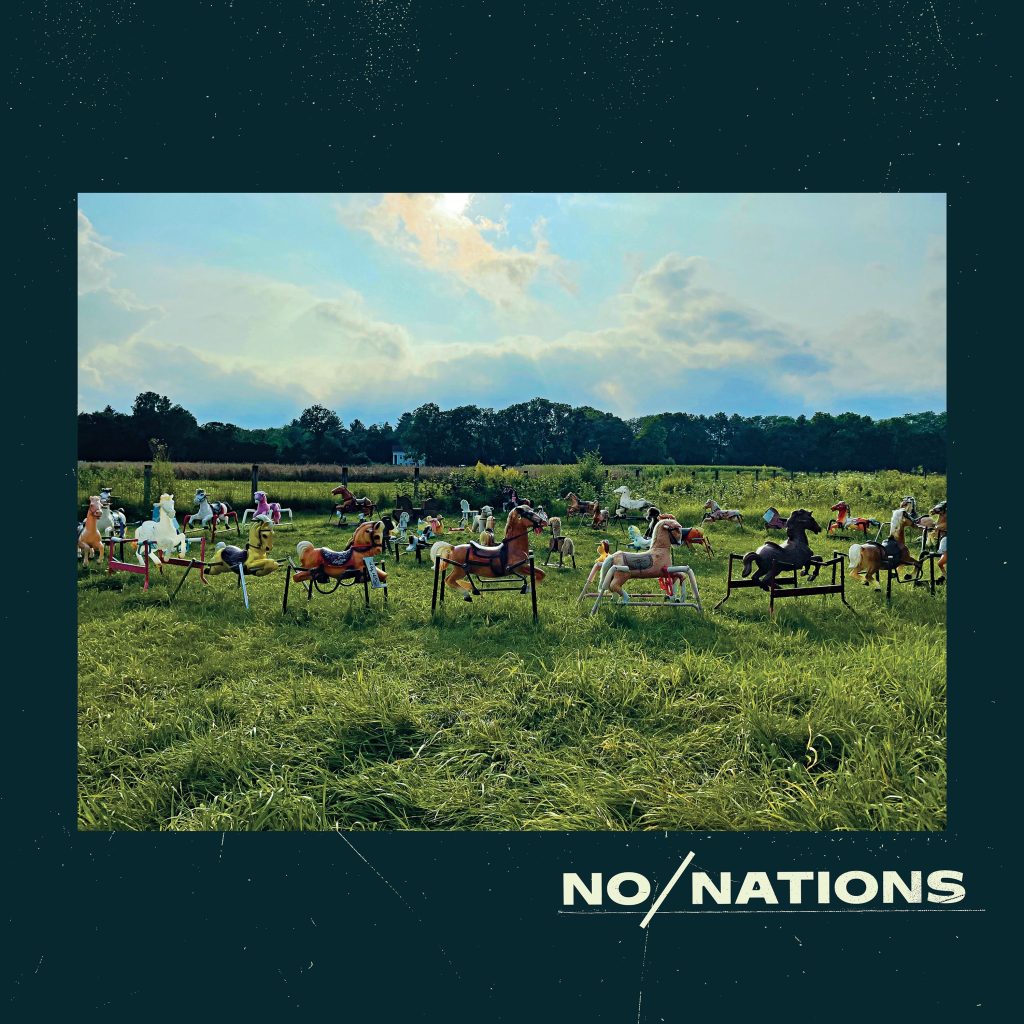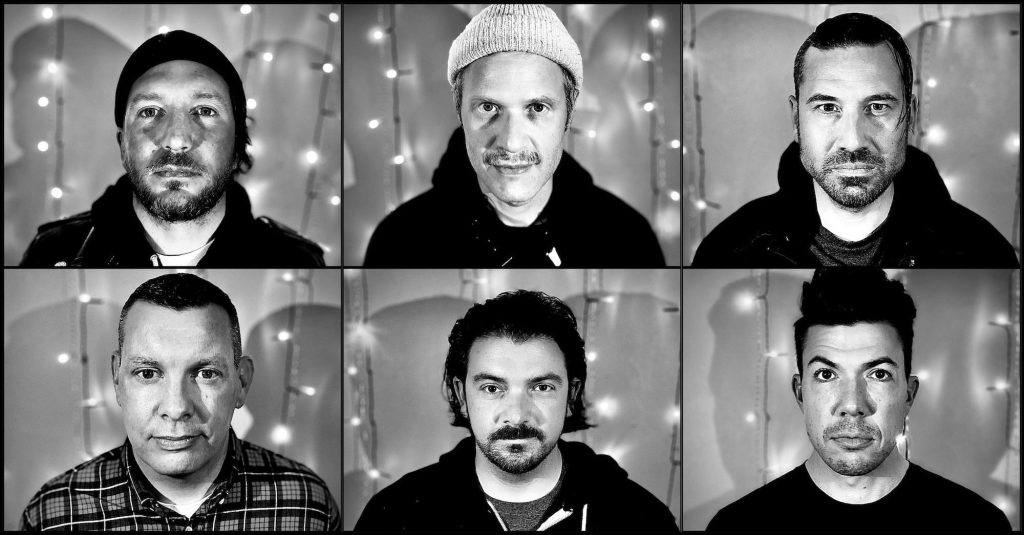There is an urgency to the music of No Nations that is as hard to define as the band itself. The Boston sextet, a group of dudes who have spent most of their lives on stage, in the van, and out in the crowd, were, like most of us, caught standing still during the pandemic.
The tension of that inactivity has manifested itself into a pair of debut tracks – this past December’s “Seltzer,” and the forthcoming “Queso,” set for release on Friday, January 21. Both songs make up No Nations’ debut cassette, self-released and recorded and mastered with Chris Johnson (Deafheaven, Doomriders) at Mad Oak Studios in Allston, Massachusetts.
Where “Seltzer” was a post-hardcore/grunge punch to the face that declared their arrival, “Queso” is a warmer embrace to help us back up, a more melodic turn of shoegaze, dream-rock, and alt-indie, that already shows a varied layer to the band’s sonic spectrum.
“When you’re starting a new project, it’s best to showcase some diversity in what a listener can expect in the future,” says vocalist Kyle Neeson. “We show a wide range, from the layered screams at the end of ‘Seltzer’, to the sing-along emo ending in ‘Queso’. More specifically, ‘Queso’ is about the kind of relationship that comes, burns, and goes, and the reactions we have to that kind of ‘there and gone’ thing.”
Says guitarist Erik Wormwood: “We were definitely feeling a little more melodic on this one, vocally as well. I think people who are familiar with Kyle’s bands in the past haven’t really heard him get into melody and harmonies and stuff. I remember the first time he sang the chorus of the song he’d written in the practice space and I was like ‘Shit I’ve never heard Kyle write lines like that’. We were all pretty stoked.”
No Nations take their moniker from a political idea that can apply to music as well: Taking down power structures that assert dominance of some more than others, and removing borders and boundary lines from everything we do as people and a society. For No Nations, that ideology is furthered in its sound, its vision, and its own ideology within the group.
Conceived by Wormwood, many of the players in No Nations have played together in past bands, with a musical DNA that runs deep in the Boston and New England music scene, extending to the likes of I am become Death, Suffer on Acid, Kimachi, Cocked N Loaded, Polarbaron, The Vershok, Mean Creek, Marconi, and countless others you saw that one time at that venue somewhere. The lineup reads like the mugshots displayed in their press photo: Wormwood and Neeson are joined by Garrett Gordon (bass), Jason Perry (guitar and synth), Jason Seaver (drums), and Steve Trombley (guitar).

No Nations are:
Erik Wormwood: Guitar
Garrett Gordon: Bass
Jason Seaver: Drums
Kyle Neeson: Vocals
Steve Trombley: Guitar
Jason Perry: Guitar and Synth
“The musical vision for No Nations I think tries to fuck with a lot of the stuff I loved about getting into music in the first place,” says Wormwood. “There are some heavier, driving rhythms that I got from playing punk and hardcore. There is some guitar interplay that takes from early ‘90s alternative music. There are melodies and melodic interplay I dig from mid- to late-’90s emo. I also love fucking around with some of the repetition of Krautrock where a simple pattern repeats and there is stuff that builds around it. Overall, I think a lot of this reflects our experiences playing in bands before. Most of us played mostly in hardcore bands and listened to alternative music in our down time so I think there is an element of that.”
“Queso” was born out of drum compositions Seaver sent Wormwood during the height of pandemic quarantine in 2020, and Wormwood fleshed them out into demos, a process repeated often for No Nations songs.
“I listened to a podcast with Janet Weiss recently and she was talking about her time in Sleater-Kinney, and how so many of their songs started with a drum beat,” Wormwood says. “I love tinkering around with notes and rhythms on the guitar, but I love writing over a beat. Like ‘Seltzer’, this song started with an arrangement of drum beats. Musically I am still super into layering modulating guitars, but I was kinda chasing this idea to layer stuff that is a little more jangly and less lush sounding. Kinda more mid-western emo in tone. I think that’s where some of the more melodic stuff came out too, I think.”

Wormwood worked with the band on the ending melody, and crafted the closing lyric “after talking to an old friend who was feeling kinda fucked up about the state of the world, and how hard stuff could feel sometimes. Everyone felt and seemed more anxious, myself included, around that time.”
That anxiousness hasn’t really gone away, it’s just been replaced by a different flavor of anxiety. Two years into the pandemic, No Nations are starting to show their own colors, and their musical reactions to life standing still. As “Queso” flows out of the speakers, the frustrated emotions of a band only able to do half the things they want to – write and record songs, but unable to play them in a live setting – are embedded in the sound.
“I’m looking forward to playing our first show; I haven’t been in front of a crowd for over two years now,” admits Neeson. “I’d love to get back out there and see what it looks and feels like.” His goals for 2022: “Write more, and constantly. Finish more songs. Play a show. Shoot a video. Solve the climate crisis. Provide a living wage to everyone. Universal healthcare. Tour the world. That’s the vision for 22, and I’m feeling it. But I’ll settle for safe practices and a nice meal with the mates after.”
In the meantime, plans to head back into the studio to record more music with Johnson are coming up. From there, it’s anyone’s guess.
“We are stoked to share ‘Queso’ with you, and we are stoked for this next batch of songs we are recording in the spring,” says Wormwood. “We are gonna try and book a show in March depending on the state of the world. We have been talking to some awesome bands both local and outta town that are so rad, so we couldn’t be happier for the chance to play a show again soon if things are on the safe side. But who knows.”
